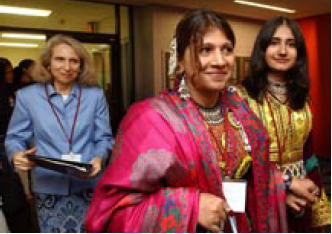

Paula Nirschel, founder of “The Initiative to Educate Afghan Women,” walks with two program participants at Roger Williams University in Bristol, Rhode Island.
If you are a student preparing to apply for admission to colleges and universities in the United States, it is important for you to understand the procedures most U.S. institutions will follow in deciding whether to admit you to their program of study.
In other countries, it is usually the ministry of education, or some similar body, that determines the general eligibility of applicants coming from outside their own educational system. In the United States, each college or university is free to set its own standard for admission and establish its own criteria to determine if a student’s academic qualifications meet that admission standard.
The higher the standard, the more selective the college and the harder it is to gain admission. U.S. schools are generally classified as: 1) highly selective; 2) selective; 3) somewhat selective; and 4) open admission (institutions able to admit students regardless of their previous academic performance).

Moussa Dao of Côte d’Ivoire sits in front of the campus bookstore at Florida International University in Miami, Florida.
Your previous study records, therefore, may meet the standards at some institutions but not at others.
It is the responsibility of the college or university to review your educational background to determine if you meet the standard required for admission.
Many institutions will have their own staff evaluate or assess your previous study. Other schools might require you to send your academic records to an agency that specializes in providing evaluations of a non-U.S. education. Sometimes an institution will specify a particular agency, or provide you with a list of several agencies from which you can choose. Despite assessing your previous education and providing the institution with their evaluation, these agencies do not make the decision whether or not to admit you. Only the college or university to which you have applied will make the admission decision.
Pay close attention to the instructions on each ad¬mission application you submit. Follow the instructions carefully. If you apply to more than one institution you will probably be required to follow different instructions for each. Do not assume that one institution’s requirements are the same as another.

A South Korean student at the University of Southern Mississippi English Language Institute serves a Korean dish during the university’s annual International Food Fair.
Regardless of whether your records are going to be reviewed by the college or university to which you apply or by an outside agency to which you have been referred, you will need to provide all of your previous academic records:
• You will need to have an official or attested copy of all of your previous academic records (often referred to in application materials as a “transcript”) sent to the institution to which you apply, and to the agency that will review your education. ‘Official records’ mean that the school where you studied must send a copy of your academic record directly to the institution to which you apply and/or to the evaluating agency. You, as the applicant, should not mail these records to the institution yourself because, if you do, the records might not be considered “official.”
• Academic records not in English will need to be translated. A copy of the translation must also be sent to the institution to which you apply and/or to the agency evaluating your education. Institutions and agencies will need to have the academic record in both the original language and the translation.
• You will need to pay particular attention to the instructions regarding translation. You might need to have an ‘official’ translation, or one by an ‘authorized’ or ‘licensed’ translator. Yet, some institutions and agencies might allow you to do the translation yourself, if you are sufficiently proficient in English.
• External examinations are an important part of the process for U.S. institutions to decide whether to admit you to their programs. If you have been educated in an educational system that uses external national examinations such as the Baccalauréat from France, or Ordinary and/or Advanced level examinations from the United Kingdom, you will need to send copies of the results of these examinations.
• If you are applying as a first-year student at the undergraduate level (for a Bachelor’s degree) you may also need to take certain standardized assessment tests usually required of U.S. applicants, too, such as the SAT or ACT. Schools will instruct you as to which tests to take and how to make arrangements for testing.
• Those applying as graduate students (for the Master’s degree or PhD) might be required to take the Graduate Record Examination (GRE), or the Graduate Management Admissions Test (GMAT) if applying for an MBA. Again, the institutions to which you apply will tell you which standardized tests are required for their graduate applicants and how to make arrangements for testing.
• If English is not your native language, or if you have not been educated in a country or region where English is a native language, both undergraduate and graduate applicants may be required to present the results of an English proficiency test, such as the Test of English as a Foreign Language (TOEFL). Graduate applicants who seek a teaching assistantship may also be required to take the Test of Spoken English (TSE) as evidence of their ability to teach in English.

A group of international students at Eastern Mennonite University in Harrisburg, Virginia are studying together on the lawn
• If you need an F-1 or M-1 (student) visa, or a J-1 (exchange visitor) visa, you will need to present evidence that you have adequate financial support for the entire period of your anticipated study. Most U.S. colleges and universities will ask you to complete a form regarding your financial backing for your studies, or will tell you what documentation is required. You will usually have to complete a form outlining the sources of your financial support as well as provide verification for it. Again, carefully follow instructions regarding financial documentation.
• Deadlines are extremely important! Please pay particular attention to any deadlines listed on the application forms. The admission of international students takes more time than does the admission of U.S. students to U.S. institutions. Most colleges and universities will have earlier application deadlines for international students, and it is essential that your application be received before that deadline. Many U.S. colleges and universities receive hundreds or even thousands of applications from international students each year. In order to be considered for admission for the term you desire, you will need to have all materials received by the indicated deadlines.
• It is highly recommended that you visit an EducationUSA Advising Center if there is one close to you in your home country. The EducationUSA offices have staff that can provide you with information about applying to U.S. colleges and universities. They also have information about specific institutions and can assist you in your search for a school in the United States. The U.S. embassy in your country can tell you the locations of EducationUSA offices, or you can find this information and more at www.educationUSA.state.gov/centers.htm.
Your studies in the United States will be an exciting and rewarding time. To start your experience in the best possible way, follow the instructions of each institution carefully. If you have any questions about your application process or what you need to provide, contact the institutions in which you are interested for clarification or assistance.

Students from Japan are browsing the Internet at the International Student Center at Concord University in Athens, West Virginia



















